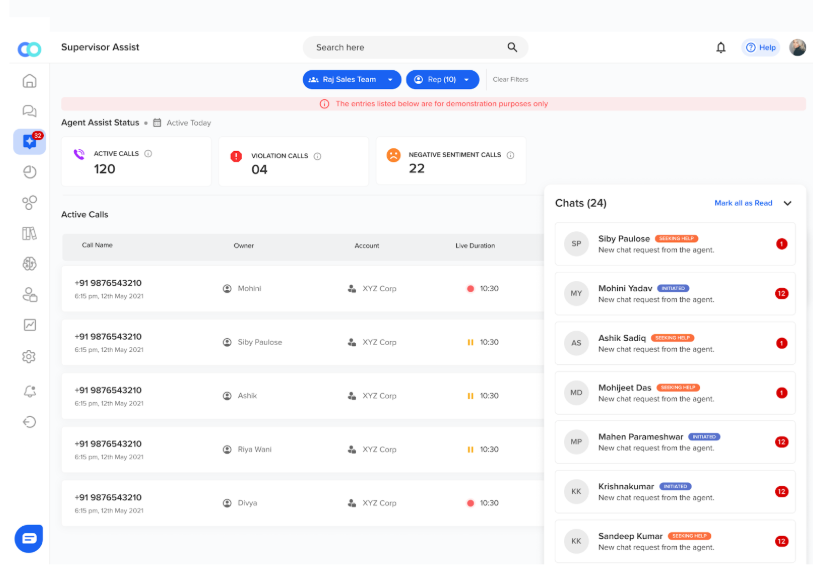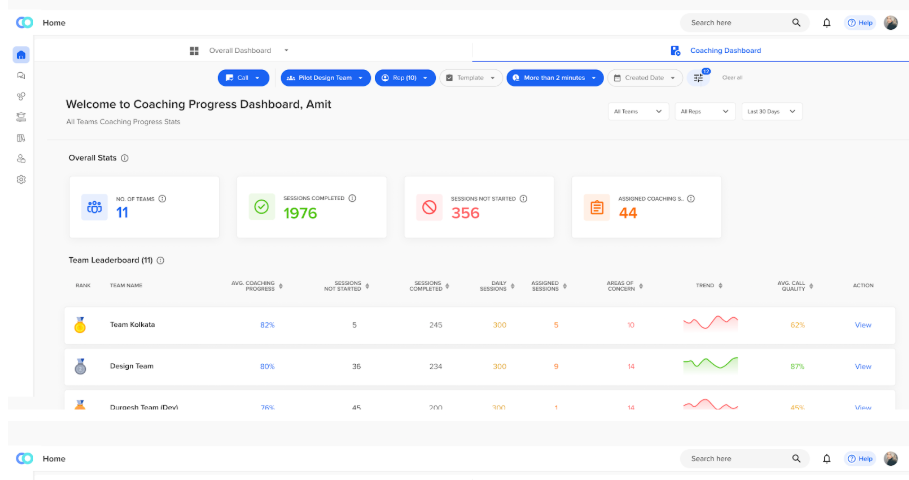The insurance industry is under immense pressure to do more, with less. Customers demand faster resolutions. Regulators expect tighter compliance. Leaders need better margins. Traditional models can't keep up, and that’s why you need intelligent automation, not as a buzzword, but as a catalyst for operational transformation.
But with all the noise around automation, the real question isn’t about the promise, it’s about the proof. Where does intelligent automation in insurance actually deliver value? How do insurers move beyond scattered tools to deploy systems that reduce friction, boost efficiency, and protect the bottom line?
In this blog, you’ll discover the most impactful use cases, from claims and servicing to underwriting and fraud.
We’ll explore how industry leaders are applying automation strategically and how platforms like Convin are enabling that shift through real-time support, voice of customer intelligence, and full conversation analytics. If you’re serious about scaling intelligently, this is where the roadmap starts.
Automate claims, servicing, and underwriting using Convin AI.
Why Intelligent Automation in Insurance Is No Longer Optional.
In 2025, over 78% of insurance leaders are increasing technology budgets, with AI and automation topping their investment list, according to Wolters Kluwer.
Another survey by Insurtech Analyst found that 82% of executives view AI as a top business priority.
Intelligent automation in insurance is no longer speculative; it’s operationally essential. For VPs and business heads, it enables faster decision-making, sharper underwriting, and sustained profitability under market pressure.
- The Shift Towards Intelligent Automation In Insurance Operations.
The insurance industry is under massive pressure to evolve. Intelligent automation in insurance operations has become a cornerstone of digital transformation, enabling insurers to meet the rising expectations of policyholders.
That shift is visible everywhere:
- Claims processing times drop by 50‑70% when insurers deploy automation tools.
- Manual documentation review drops by around 60% with NLP & machine‑learning support.
- Digital-first policyholders expect 24/7, responsive, and accurate support across channels.
The shift is no longer just about doing things faster. It’s about being reliable, transparent, and consistently meeting customer expectations. Intelligent Automation in Insurance operations isn’t optional; it’s expected.
- Top Insurtech Automation Trends Disrupting Legacy Systems.
Legacy systems can’t keep up with today’s insurance landscape. Let’s explore the top insurtech automation trends that are actively replacing legacy systems. These trends define how modern insurers are restructuring operations.
Here’s what’s shaping the new normal: Generative AI and conversational AI are transforming contact centers, enabling real-time, context-aware responses that reduce resolution time and improve customer satisfaction.
Voice of Customer analytics is helping insurers decode intent and sentiment, transforming reactive service models into proactive engagement strategies.
Meanwhile, RPA and AI are converging to create end-to-end intelligent process automation in insurance, optimizing everything from claims to compliance sources.
Legacy systems that don’t adapt will struggle. The winners are integrating insurtech automation in insurance across every customer touchpoint.
- Drivers Behind Insurance Workflow Automation Adoption.
But what’s fueling this automation movement across insurance operations? The answer lies in the outcomes.
Across the board, executives are reporting cost reductions of 20-30% through intelligent automation in core workflows, such as claims management and fraud detection.
These technologies also lead to a marked decrease in human error while simultaneously tightening compliance.
At the same time, there is a surging demand from policyholders who now expect fast, digital-first, and transparent service experiences, raising the bar for what insurers must deliver.
Insurance workflow automation is no longer just for cost-cutting. It’s a strategic lever for consistency, compliance, and customer trust.
With the strategic context in place, it’s time to examine how intelligent automation in insurance delivers measurable impact, through data, results, and real-world execution.
Get 20-30% cost reduction with Convin AI
Real‑World Impact of Intelligent Automation in Insurance
Results are the true benchmark for any technology investment, especially in insurance, where margins, risk, and policyholder experience converge.
Intelligent automation in insurance is now delivering measurable business outcomes, not just operational gains. From faster claims cycles to stronger compliance and bottom-line savings, here’s how the impact shows up on the ground.
- Cost Savings With IA In Insurance: What The Numbers Say
Executives are going beyond theory; they’re seeing change. For example, some insurers leveraging AI and automation have achieved 50‑70% reductions in claims processing time, especially in intake and adjudication workflows.
Meanwhile, document backlogs in certain mid-market insurers have decreased by ~40% after implementing RPA, NLP, and intelligent document processing.
In workflows such as claims, onboarding, and policy servicing, document automation has resulted in up to a 65% reduction in operational costs.
These figures aren’t edge cases, they are real outcomes. Intelligent automation in insurance is freeing up budget, increasing efficiency, and enabling insurers to redirect resources toward growth, innovation, and customer delight.

- Case Study: Intelligent Process Automation In Insurance Claims
Let’s zoom in on one high‑stakes process: claims handling. When insurers adopt intelligent process automation in insurance claims with tools like Convin, the transformations are concrete.
Real‑World Impact:
- Convin’s real‑time agent assists audits and scores 100% of customer conversations across voice, chat, and email, no sampling. This enables early intercost reductions of vention compliance guardrails.
- Agent onboarding speed,s improve by 60% when Convin’s automated coaching and real‑time feedback are used.
- False positives in fraud detection (or “fraud‑risk flagging”) improve: graph‑based AI+ML methods can improve claim fraud identification accuracy by over 45%, reducing wrongful flags or unnecessary investigations.
These are not modest tweaks. With precision automation, insurers are experiencing fewer errors, shorter cycles, and increased trust from policyholders. Processes once prone to delay or oversight now operate with clear visibility and less risk.
- ROI Outcomes From Effective Insurance Automation Strategy.
The secret to strong returns? A coherent insurance automation strategy.
When intelligent automation in insurance is deployed with purpose, results follow. These are the results reported by insurers who use automation in their insurance ops:
- Efficiency in complex underwriting rising by ~36%
- Claims processing costs falling by ~20‑50% depending on process complexity
- A 14% reduction in handle times; and CSAT rising by around 10‑12% in early months.
When strategy guides the tools, ROI becomes a byproduct. Automation becomes an engine, not an experiment.
With impact clearly demonstrated across operational metrics, the next logical step is to pinpoint where intelligent automation in insurance is making the biggest difference, specific, high-leverage use cases that drive both efficiency and experience.
Save upto 60% ops cost using intelligent automation with Convin AI
This blog is just the start.
Unlock the power of Convin’s AI with a live demo.

High‑Impact Use Cases for Intelligent Automation in Insurance.
While automation has broad utility across insurance operations, certain functions yield disproportionate returns when intelligently automated.
These high-impact areas represent critical pressure points where efficiency, accuracy, and customer satisfaction intersect, making them ideal candidates for transformation.
- Automating Underwriting With Intelligent Automation In Insurance
Underwriting has always been complex, with lots of data, decisions, and risk. Now, intelligent automation in insurance underwrites many of those moving parts with speed and precision.
As experts report, AI‑powered underwriting is transforming risk assessment with predictive modeling, document validation, and dynamic scoring.
Underwriters gain real benefits:
- Manual underwriting bottlenecks are shrinking. Tasks such as document ingestion, data validation, and rule-based approvals are shifting from days or weeks to minutes.
- Discrepancies and risk anomalies get flagged early, with AI systems trained on historical data, unstructured inputs, and external sources. That means fewer surprises and more consistent decision-making.
- Standard policies are increasingly “auto‑approve.” Low-risk or well-structured applications move through end-to-end automation, freeing up underwriters for only the high-complexity or high-exposure cases.
Intelligent automation in underwriting doesn’t just speed things up; it increases accuracy, consistency, and scalability.
Insurers who lean into automation here often gain a competitive edge, experience less manual rework, achieve faster policy issuance, and maintain better risk governance without sacrificing underwriting discipline.
- Streamlining Policy Servicing With Insurance Workflow Automation.
Servicing is where insurers interact most frequently with their policyholders, handling everything from renewals to mid-term adjustments.
Intelligent insurance workflow automation streamlines these tasks, reducing manual data handling and minimizing the need for customer callbacks. With systems that guide agents and pre-fill forms, routine servicing becomes seamless.
Convin’s voice of customer insights further strengthens the process by uncovering friction points and revealing resolution gaps, allowing insurers to continuously refine their workflows and deliver consistent, responsive service.
Efficient servicing isn’t just beneficial for customers; it’s also beneficial for margins.
- Enhancing Fraud Detection Via Intelligent Process Automation In Insurance
Fraud continues to be a significant drain on insurer margins, and a threat to customer confidence. Intelligent automation helps insurers tackle this challenge with speed and precision.
AI systems now monitor vast data sets across voice conversations, forms, and historical claims to detect behavioral anomalies that signal potential fraud.
By applying real-time intelligence, these systems can flag and route suspicious activity for further review before it escalates, helping insurers proactively mitigate risk and protect both their finances and brand trust.
Intelligent process automation in insurance enables faster, more scalable, and accurate fraud detection.
So what’s enabling all of this? Let’s explore how Convin delivers these outcomes with its core product suite.
Automate underwriting for faster policy approvals with Convin AI
How Convin Powers Intelligent Automation in Insurance
Convin delivers end-to-end intelligent automation in insurance by empowering agents, streamlining workflows, and unlocking real-time insights, enabling insurers to scale both service and efficiency.
- Voice of Customer and Insurance Automation Strategy
Customer feedback is more than just sentiment; it’s thoughtful intelligence. Convin’s Voice of Customer tools transform every interaction into actionable data, enabling continuous improvement across service and operations.
By extracting recurring themes, objections, and points of friction from calls, chats, and emails, Convin helps insurers uncover hidden gaps.
These insights surface not only service shortcomings but also deeper product or process issues, offering a roadmap for more responsive and effective automation strategies.
With VoC, insurance automation strategies stay responsive, relevant, and effective.
- Real‑Time Agent Assist Driving Cost Savings With IA In Insurance.
Real-time support is essential for high-performance insurance teams. Convin’s agent assist delivers exactly that by equipping frontline agents with AI-driven prompts, contextual guidance, and automated playbooks during live customer conversations.
These tools reduce errors, increase conversion rates, and ensure regulatory compliance, all without slowing agents down. Agents receive in-the-moment nudges, tailored scripts, and objection-handling cues that improve both speed and precision.
As a result, Convin clients have reported a 27% increase in CSAT, a 21% lift in sales, and a 17% improvement in collections. The impact is clear: this isn’t just about cutting costs, it’s about enabling consistently better performance at scale.

- Contact Center Intelligence: Transforming Insurance Workflow Automation
In an environment where every customer conversation can impact satisfaction, compliance, and conversion, visibility is everything.
Convin’s Contact Center Intelligence delivers just that, analyzing 100% of interactions across channels, not just random samples. This comprehensive QA automation enables insurers to identify performance gaps, training needs, and compliance risks promptly.
Beyond quality control, the system uncovers sentiment trends, monitors adherence to regulatory standards, and pinpoints opportunities for coaching. It's this continuous loop of insight and optimization that turns day-to-day interactions into strategic drivers of performance.
With Convin, insurance workflow automation gets smarter over time. Insights drive better decisions and outcomes.
With technology, use cases, and ROI aligned, the final step is turning automation into a long-term strategy.
Monitor 100% of calls with Convin’s AI QA automation.
Intelligent Automation in Insurance That Pays Off.
Intelligent automation in insurance has moved beyond cost containment; it's now central to how insurers compete, grow, and build trust with policyholders. As demonstrated by real-world results across claims, servicing, underwriting, and fraud detection, automation is driving measurable improvements in efficiency, compliance, and customer experience.
Tools like Convin’s agent assist, voice of customer insights, and contact center intelligence are helping insurers operate smarter at scale. However, automation only delivers its full potential when aligned with business goals.
Executives must define clear metrics, focus on high-impact workflows, and build a culture of continuous optimization. For insurance leaders ready to future-proof operations, intelligent automation isn’t a project; it’s a strategic advantage that compounds over time. The question isn’t whether to automate, but how fast you’re willing to lead.
Ready to unlock measurable results across your insurance operations?
Future proof your insurance platform with Convin AI
FAQs
- What are the benefits of automation in insurance?
Automation in insurance enhances efficiency, reduces claim cycle times, lowers operational costs, and improves the customer experience. It enables insurers to eliminate manual errors, speed up underwriting, and handle higher volumes with fewer resources. Tools like Convin’s Voice of Customer and Real-Time Agent Assist help teams move faster while staying compliant.
- What is the main purpose of intelligent process automation?
The core goal of intelligent process automation in insurance is to streamline complex workflows using AI, machine learning, and analytics. It automates repetitive tasks, improves decision accuracy, and supports agents in real-time. The result is faster claims, smarter fraud detection, and consistent service quality.
- How is AI being used in the insurance industry?
AI is used in insurance to analyze risk, predict fraud, personalize policies, and automate claims. It powers real-time insights from customer interactions, supports underwriting decisions, and drives intelligent automation across service operations. Convin uses AI to analyze 100% of conversations and surface actionable data for agents and leaders.
- What is the biggest benefit of automation?
The biggest benefit of automation in insurance is scalable performance, achieving higher output without increasing overhead. It frees up teams to focus on complex tasks while ensuring speed, consistency, and compliance. When powered by platforms like Convin, automation becomes a growth engine, not just a cost-cutting tool.



%20BLOG10%20examples%20of%20artificial%20intelligence%20in%202024.webp)



.avif)


.avif)